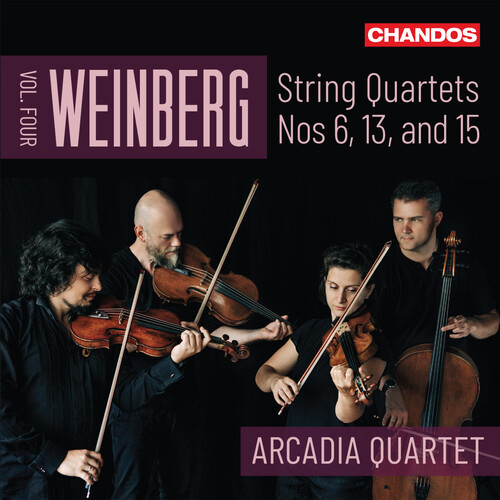Show results for
Deals
- 4K Ultra HD Sale
- Action Sale
- Alternative Rock Sale
- Anime sale
- Award Winners Sale
- Bear Family Sale
- Blu ray Sale
- Blues on Sale
- British Sale
- Classical Music Sale
- Comedy Music Sale
- Comedy Sale
- Country Sale
- Criterion Sale
- Electronic Music sale
- Fantasy Film and TV
- Folk Music Sale
- Hard Rock and Metal Sale
- Horror Sci fi Sale
- Jazz Sale
- Kids and Family Music sale
- Kids and Family Sale
- Metal Sale
- Music Video Sale
- Musicals on Sale
- Mystery Sale
- Naxos Label Sale
- Page to Screen Sale
- Paramount Sale
- Pop and Power Pop
- Rap and Hip Hop Sale
- Reggae Sale
- Rock and Pop Sale
- Rock Legends
- Soul Music Sale
- TV Sale
- TV Sale
- Vinyl on Sale
- War Films and Westerns on Sale

String Quartets Vol. 4
- Format: CD
- Release Date: 7/19/2024

String Quartets Vol. 4
- Format: CD
- Release Date: 7/19/2024
- Composers: Mieczyslaw Weinberg
- Label: Chandos
- UPC: 095115228128
- Item #: 2651951X
- Genre: Classical Artists
- Release Date: 7/19/2024

Product Notes
The Arcadia Quartet's acclaimed survey of Weinberg's String Quartets continues with this fourth volume containing Quartets Nos 6, 13, and 15. Quartet No. 6 was composed in 1946 in Bïkovo, a town some twenty miles from the south-eastern perimeter of Moscow. Weinberg dedicated it to his friend Georgiy Sviridov, whom he had met in Shostakovich's circle. The Quartet is a summit of his early achievements, and it's musical language is strikingly advanced in relation to traditional Soviet works in the genre. It was banned by the authorities, and as a result, Weinberg wrote no more quartets until after the death of his mentor Shostakovich, in 1975. String Quartet No. 13 was composed in 1977 and dedicated to the Borodin Quartet. Like Shostakovich's Thirteenth Quartet, written seven years earlier, it comprises a single movement lasting some fourteen or fifteen minutes, making it the shortest of all Weinberg's quartets. String Quartet No. 15, from 1979, is in many respects the most radically conceived of all Weinberg's quartets - certainly it's nine-movement design suggests so. In expressive terms, too, it is one of the most elusive. The movements carry no titles or expressive directions, and, as in the case of his previous two quartets, Weinberg confines himself to metronome indications, avoiding all specification of character.

